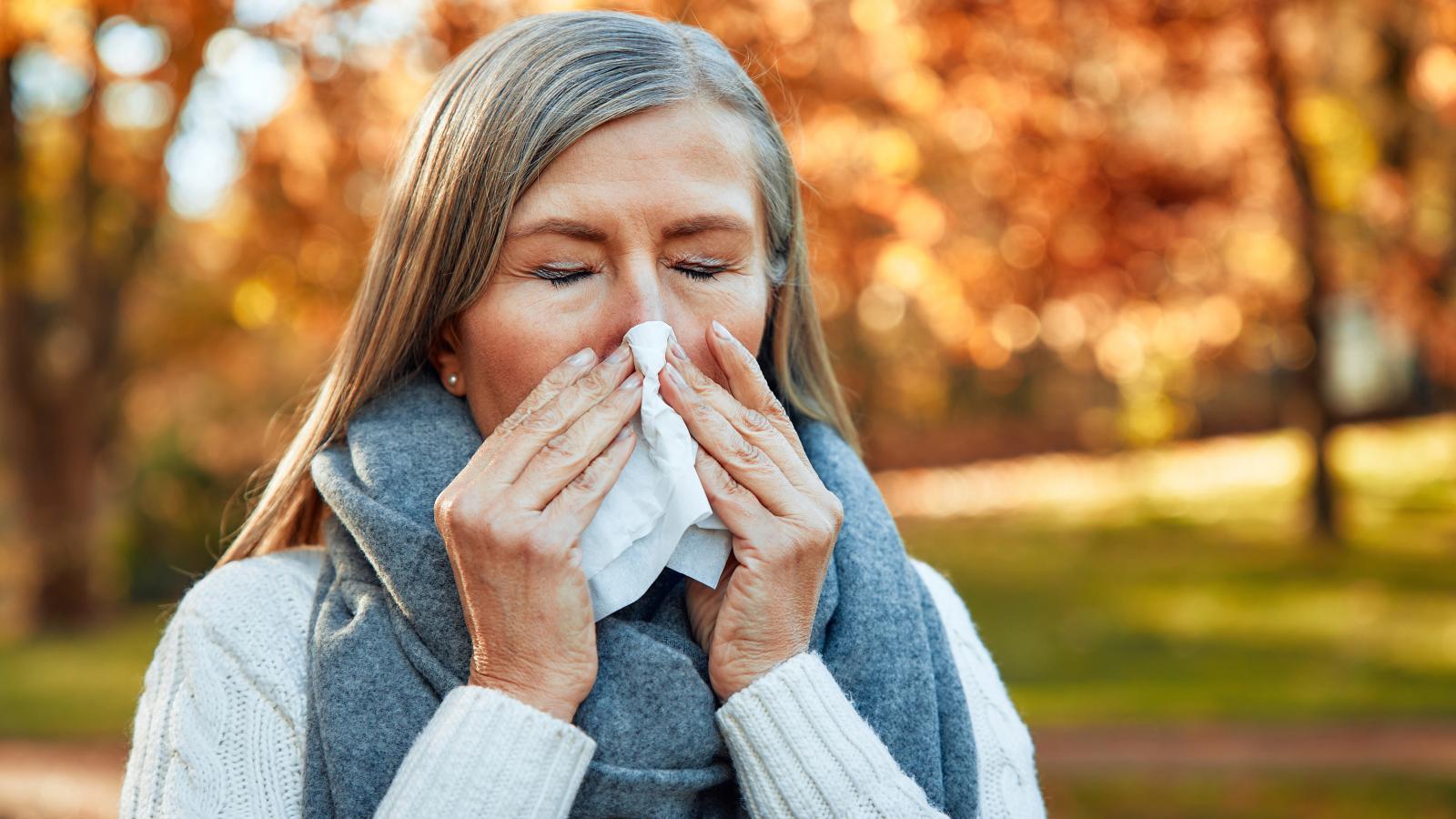Fall Allergies or a Cold? How to Tell the Difference

Sniffling and sneezing? Here's how to determine what's to blame.
As the air turns crisp and the leaves start falling, you may suddenly find yourself sneezing and sniffling. Your eyes may also be watery, and you may even feel like your head is in the clouds. When this happens, how do you know if you're dealing with fall allergies or if you've caught a cold? The symptoms can be similar, which can make it tricky to determine what's to blame.
Allergies vs. Colds: What's the Difference?
Here's a brief overview of these common conditions that highlights some differences to make it easier to figure out what may be causing your symptoms:
- Allergies are your body's way of overreacting to things like ragweed pollen, mold or dust. Common symptoms include sneezing, a runny or stuffy nose, itchy eyes and sometimes an itchy throat or ears. You usually won't get a fever. Your symptoms can last for weeks if you're around the trigger.
- Colds are caused by a virus. They can start with a sore throat, then move on to congestion, a runny nose, sneezing, mild fatigue, body aches and sometimes a cough. You might get a low-grade fever. Symptoms usually clear up within 7 to 10 days.
If your eyes are itchy and watery, allergies are more likely to blame. If you're feeling achy, tired or have a fever, it's probably a cold.
What About the Flu or COVID-19?
The flu and COVID-19 can have symptoms that are similar to colds, but they tend to cause more severe fatigue and body aches, as well as higher fevers. Newer strains of COVID-19 may also cause symptoms such as a very painful, scratchy sore throat (referred to as "razor blade throat"), hoarseness or a raspy voice.
Tips to Feel Better This Fall
Whether allergies or a cold are causing your symptoms, all you want to do is feel better. Here are some tips that can help:
If it's allergies:
- Keep windows closed during high pollen days.
- Shower and change clothes after spending time outside.
- Avoid touching your face, especially your eyes, nose and mouth.
- Use a saline nasal rinse to wash allergens out of your nose.
- Try over-the-counter antihistamines or nasal sprays to ease symptoms (follow directions carefully).
If it's a cold:
- Rest as much as possible and drink plenty of fluids.
- Use a humidifier to help with congestion.
- Wash your hands often to help prevent the spread of germs.
- Listen to your body. If you feel run-down, take it easy.
- Try over-the-counter cold medicines to ease symptoms (follow directions carefully).
Allergies and colds can make you feel pretty similar, but paying attention to specific symptoms and when they're at their worst can help you figure out what's going on. Keep in mind that allergies usually stick around as long as you're exposed to your triggers and don't cause fever, while colds are short-lived but can make you feel more run-down. And remember that flu and COVID-19 can also be possible culprits.
If your symptoms are severe, last longer than expected or you're not sure what's causing them, it's a good idea to check in with your doctor.
Speak with a Specialist
Make your appointment with a Guthrie allergy specialist today.
Copyright 2025 © Baldwin Publishing, Inc. Health eCooks® Heart Healthy Recipes® is a registered trademark of Baldwin Publishing, Inc. Any duplication or distribution of the information contained herein without the express approval of Baldwin Publishing, Inc. is strictly prohibited.
Date Last Reviewed: August 19, 2025
Editorial Review: Andrea Cohen, Editorial Director, Baldwin Publishing, Inc. Contact Editor
Medical Review: Perry Pitkow, MD
Learn more about Baldwin Publishing Inc. editorial policy, privacy policy, ADA compliance and sponsorship policy.
No information provided by Baldwin Publishing, Inc. in any article is a substitute for medical advice or treatment for any medical condition. Baldwin Publishing, Inc. strongly suggests that you use this information in consultation with your doctor or other health professional. Use or viewing of any Baldwin Publishing, Inc. article signifies your understanding and agreement to the disclaimer and acceptance of these terms of use.

